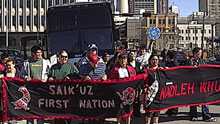
About 40 protesters marched through downtown Calgary Wednesday to denounce Enbridge's planned Northern Gateway pipelines project. Erin Collins/CBC
cross posted from CBCNews
About 40 people marched through downtown Calgary Wednesday to protest a proposed pipeline project that would carry oilsands crude to the west coast.
Calgary-based Enbridge wants to build two pipelines from Alberta to Kitimat, B.C., stretching 1,170 kilometres.
The $5.5-billion Northern Gateway project would carry about 525,000 barrels of oilsands crude per day from a site near Edmonton through the mountains to a proposed terminal in Kitimat, B.C. There it would be loaded onto tankers headed to the U.S. and Asia.
But several first nations groups are trying to kill the project because they believe it threatens their wildlife habitats, posing the risk of an oil spill either along the pipelines or from tanker traffic along the Pacific coast.
Led by the Yinka Dene Alliance, the group of first nations opposed to Enbridge’s plan includes three from Alberta, four in B.C. and one in Manitoba.
Chiefs planned to address the company’s shareholders Wednesday at Enbridge’s annual general meeting.
At a meeting with the board of directors on Tuesday, the alliance laid out a hard stance against the pipelines.
“We told Enbridge’s board and CEO — right to their faces — that we’re not here to negotiate a better deal,” said Chief Jackie Thomas of B.C.’s Saik’uz Nation said in a written release.
“Enbridge’s money is worthless to us because their pipeline will cause oil spills that could destroy the rivers, fish and animals that are the lifeblood of our people and culture.”
The stance taken by the alliance does not reflect wider public opinion among the stakeholders, according to Enbridge spokesman Paul Stanway.
“This is by no means representative of the majority view,” he said. “Put it into proper context. Enbridge has a safety record that’s considerably higher than the industry average.”
The company spent $150 million in 2009 on safety programs, he added. “So this is something we take very seriously,” he said.
Regulatory approval of Northern Gateway is ultimately up to a joint panel of the National Energy Board and the Canadian Environmental Assessment Agency.
“A decision by Canada to approve this project, without the free, prior and informed consent of affected Nations, will be a violation of our Treaties, our rights, and our laws, and will be in breach of the UN Declaration of the Rights of Indigenous Peoples and other international accords,” the opponents declared in a written statement.
